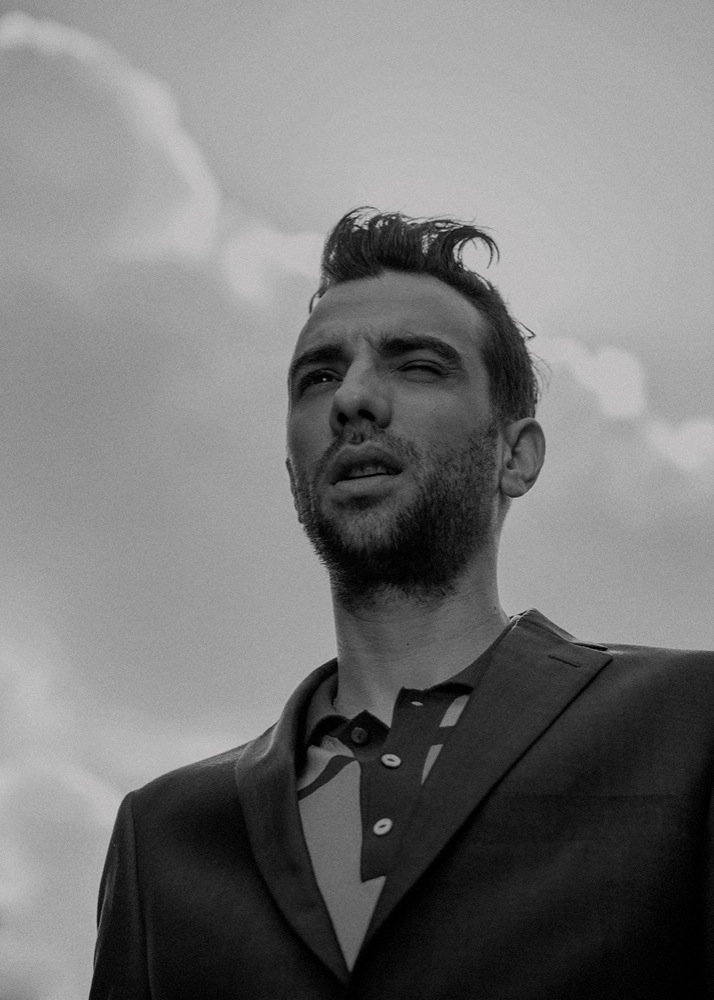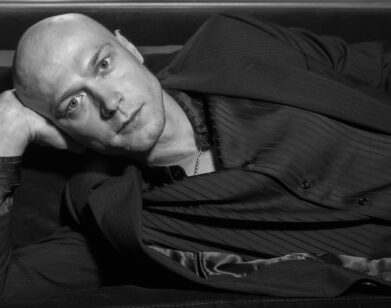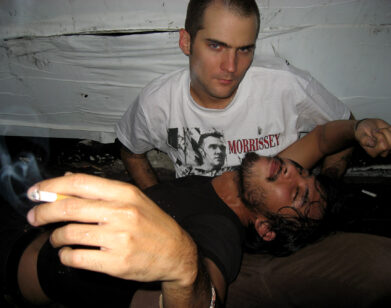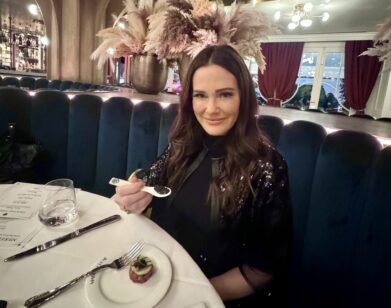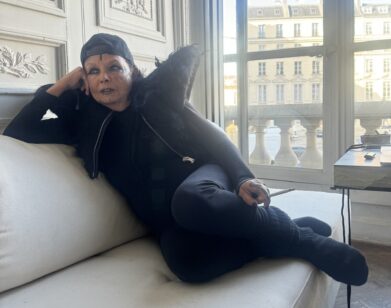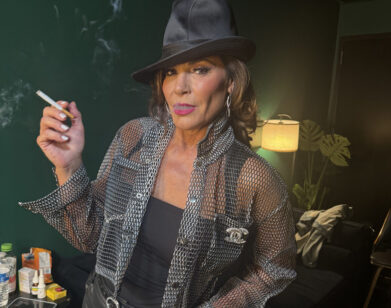Jay Baruchel
JAY BARUCHEL AT THE FARMER’S DAUGHTER HOTEL IN LOS ANGELES, JANUARY 2017. PHOTOS: BRIAN HIGBEE/COPIOUS MANAGEMENT. STYLING: DJUNA BEL/GIANT ARTISTS. GROOMING: KIM VERBECK/THE WALL GROUP.
After two decades in film and television, Jay Baruchel has acquired a pretty diverse fan club. Raised in Montreal, the now 34-year-old actor began his career on Canadian shows such as My Home Town, before getting his big break as the protagonist of Judd Apatow’s 2000 comedy series Undeclared. Though Undeclared, which co-starred Seth Rogen and Charlie Hunnam, was cancelled after a single season, Baruchel remained part of the Apatow family, appearing in Apatow’s Knocked Up (2007) and Rogen and Evan Goldberg’s This Is The End (2013). In the intervening years, he has done everything from comedic blockbusters (2008’s Tropic Thunder) to family films (he voices Hiccup in the How to Train Your Dragon series) to art-house indies (David Cronenberg‘s Cosmopolis, 2012).
One of the things that makes Baruchel so appealing is his ability to combine humor and authenticity. In his current television series, FXX’s Man Seeking Woman, for example, Baruchel plays Josh Greenberg, a young, romantic guy looking for love (he gets a girlfriend in the third season). This is not your typical rom-com; rather each episode gives a different, surrealist take on Josh’s love life. A typical “meet the parents” scenario turns into a faux horror sequence in one episode, and in another, a relationship milestone is portrayed with an appropriately epic medieval storyline.
Although he is best known as an actor, Baruchel’s appreciation for filmmaking has led him to write and direct his own material. In 2011, he wrote, produced, and co-starred in the ice hockey comedy Goon, and next month, he will make his directorial debut with the film’s sequel, Goon: The Last of the Enforcers.
ELOISE BLONDIAU: What are your general feelings about romantic comedies? You’ve played them pretty conventionally before, but Man Seeking Woman is more absurd.
JAY BARUCHEL: At one time or another, everyone’s had the rom-com itch that needs to be scratched. People always like to have a good time and laugh, and, [among] the vast majority of the seven billion people on this earth, one thing that we all have in common is at some point we all need to pair up and find some sort of significant other, some sort of romantic counterpart.
I think that that’s probably why people keep gravitating towards this type of stuff. I think one of the reasons why I immediately connected to Man Seeking Woman was because it scratches those itches, but it does it in a way that I’d really never seen before. It’s uncommon and authentic and its own thing and not just what the genre needed, but what TV and movies needed.
You always want to try and evolve an art form. It’s not a very humble ambition; it reeks of arrogance. If you can, you want to try to do something that people haven’t done before and give people something that they haven’t seen. Our show defies comparison, for better or worse. It’s an impossible show to describe, which might speak to our niche audience. We also dig that because it’s our pirate ship and we get to do our own thing.
BLONDIAU: Man Seeking Woman does not heed the standard hallmarks of romance. It kind of makes fun of those hallmarks in a way that is interesting, but it carries you along.
BARUCHEL: But it still always wears its heart on its sleeve, which is why I think it succeeds. If we were to just make fun of those hallmarks and do some version of pissing on tradition, I think it would come off as wanky and arrogant and like we had a chip on our shoulder. I think our show, really when you look at it, the themes are ultimately quite old fashioned. As fucked up and eccentric as its viewpoint is, it’s ultimately a pretty optimistic one.
BLONDIAU: But the romantic comedies that you’ve been in before, like She’s Out of My League or I’m Reed Fish, they aren’t sappy or straight-laced either. It’s just that Man Seeking Woman takes those awkward moments that may have been just short scenes in a traditional rom-coms, and then runs with it.
BARUCHEL: That’s exactly it. We do a pretty damn good job at—forgive me for using these words—crystallizing minutiae. We find a way to take these things that, like you said, would just be a fleeting moment in another movie or a TV show, and dwell on it and make it life or death. In those moments in real life, that’s how it feels. The stakes are high. Regardless of how insane it might be, when you dig somebody you just met and you send that first text, goddamn, it’s an eternity before you get the reply back. We found a way to swing that into almost an entire act.
BLONDIAU: Obviously you want to have fun; you want to have some genuine emotion there. So where is the line drawn? Are those conversations that you have on set?
BARUCHEL: Constantly. It’s less a line than it is an elastic ceiling that we can push up against. There are certain moments that allow us to get away with something, which would not really work in another moment. We try things out and not everything that we experiment with on set ends up on TV. We have this sandbox to play in.
One of the really cool, rare things about our set is every scene we shoot is effectively a workshop. As long as the scene is about the same thing—what it’s supposed to be about—we get to break things down and try different ways in. It’s a combination of instinct and experimentation. It’s got to be serving the story. The two analogies that I’ve used are pirate ship and sandbox, and they’re both super applicable. Our network has been incredibly open. They really dig our show. They know that the process we have yields that show and they allow us that fucked up, weird process. It’s uncommon to have somebody give you the resources to just create. It’s a pretty beautiful thing. Everyone talks about how much fun every set their on is and what a family they are, and I don’t mean to be assuming that mantle cliché, but ours is a real special one. We’ve done three seasons so a lot of us, cast and crew, are like fucking family and enjoy each other’s company. Our studio is seven minutes away from the house that I live in. A lot of the same team and crew on our set worked on the movie that I directed, Goon.
There’s an incredibly comfortable, safe environment and you’re just that much more comfortable around friends than around strangers. We do table reads of the next block of scripts on our lunch hour on a workday. There’s no reason for our crew to come —in their right minds, they should be eating and then taking a nap and taking advantage of the extra half hour lunch—but every single one of them comes and sits down and watches the whole thing and laughs and participates and takes ownership of it. I guess all I’m trying to say is that there’s a pretty special vibe and I think the heart of it shines through when you watch the show.
BLONDIAU: Is there anything about TV that you enjoy compared to the process of making movies?
BARUCHEL: It’s all the same shit ultimately. I’d say we have more time in movies, but that’s not necessarily true either. The pace feels a bit more breakneck in the moment on a TV set than it does on a movie set. I would prefer to work that way. I hate sitting around when it’s work time.
What I love about [TV] is this: It’s a specific thing to be able to tell a satisfying, rewarding story in less than 25 minutes. Not everyone can pull that off. There’s something really cool about giving lit people a bunch of little mini movies.
Also, there’s something about TV shows and the format that becomes a bit more personal. People watch two, three in a row before they get out of bed on their laptop or when they get home from going out and before they go to sleep. People make shows part of their daily routine, and that makes them take ownership of it. If you’re so arrogant as to call yourself an artist, you can’t ask for anything more than that.
BLONDIAU: Man Seeking Woman films in Canada, as did Goon. Is that something that you try to do every opportunity you get?
BARUCHEL: Absolutely. If I were from any other country in the world, it wouldn’t even be a thing—people wouldn’t wonder why. There’s this weird thing with Canada because of our geographical proximity to the states. Before World War II in Canada, you were nobody until you went to England. Then, after that it was you’re nobody until you went to the States. In my family, the brass ring was never outside of Canada. That’s probably because my dad is a first-generation immigrant and my mom’s family have been here for 300 years. My granddad and a great deal of my uncles and my cousins are all soldiers and were Mounties and have served the country. I was raised in a fairly patriotic household.
For Goon, it’s a real special thing because it’s not just a movie that we got to make here, it’s a movie that takes place here. It’s something I want to do going forward—make a movie that is commercial and universal and will play in any movie theater or living room in the States or the UK, but is definitively Canadian. I don’t think there’s such a thing as prohibitively Canadian. I don’t think the movie starts and someone sees a Nova Scotia license plate and they’re like, “Okay, fuck this. I don’t get this.” I just don’t think they see Canadian money in a wallet and they’re like, ” That’s it, warm the car up. I’m getting out of here.” It just doesn’t work like that.
I like to say that doubting oneself is Canada’s only native art form. It’s a blessing and a curse. It raises you firmly with the belief that you’re not shit and nobody owes you anything, which is a good thing. It makes you humble and hardworking. The problem is there are times when you should be able to wave the flag and light off a firecracker or two. I’m excited to start doing that in cinema. I try to tell people in the states, “Back home, we would rather you fail abysmally at something than ever be a showoff about it and succeed!” [laughs] A humble failure is much more palatable.
BLONDIAU: Let’s talk about doing your upcoming movie, Goon. What’s your favorite thing about your character in it? Do you get to channel your inner hockey fan or are you as unrestrained in real life?
BARUCHEL: Somewhere in the middle [laughs]. I created this bone-head character. He’s kind of my doppelganger or my double in the psychological, alchemical sense. He’s where I put every bad impulse and idea and instinct that I usually keep at bay or keep under the surface.
I grew up in Montreal, and Montreal is a five-hour drive up from Boston. You can drink at 18 in Montreal. In Boston, it’s 21. You know where I’m going with this … in Montreal we grow up inundated with drunken kids from Massachusetts, and add to the mix the fact that the greatest rivalry in hockey is Boston versus Montreal—he’s a bit of a hate/love letter to every kid from Boston I met.
BLONDIAU: Did you always know that you wanted to write and direct?
BARUCHEL: Yeah. It actually predates acting, which sounds crazy because I started acting when I was 12 years old. It was at 9 that I said to mom and dad, “I want to direct horror movies and action movies when I get older. That’s all I want to do.” Movies have been my life. My dad bought me Ferris Bueller’s Day Off on VHS for my eighth birthday. That was the beginning of my collection, which has gone from VHS to DVD to Blu-Ray. I’m the schmuck who still buys physical copies of movies.
When I started acting, my mom said, “If you want to go to film school and eventually direct, being on set is probably the best film school in the world.” I’m incredibly grateful for the career I’ve had, but I was an actor to be a part of movies and TV, not the other way around. I just adore being on set. I adore storytelling. I can be on a set 70 hours a week and on those weekends, I’ll still want to watch movies. What I do for a living and how I unwind are one and the same; it’s a rare special thing.
My mom said to me when I was a little kid, “You don’t have to hate your job. Just because you see all these unhappy grown-ups doesn’t mean you have to be one of them.” She said, “Find something that you would do for free and find a way to get paid to do it.” That’s been my guiding principle.
BLONDIAU: Can you see yourself going completely behind the scenes and never acting again?
BARUCHEL: Again, if you want to make god laugh, make a plan. I say this and who knows—something cool might come along. I’ve had makeup on my face and people poking at me and staring at me and I’ve been the center of attention since I was 12 years old. I’m much more comfortable with my hoodie up, sitting in the shadows. It seems to suit me far more now. Whether or not I may be good at it is the question—that will definitely be up to audiences when they see Goon 2 and decide if it’s awesome or it’s a pile of garbage, in which case this conversation is moot. I count absolutely no chickens before they’re hatched. In fact, I assume they’re all dead in their shells, inside their eggs. If kids dig the movie, then it’s something I would really really want to keep doing. I’m really excited because I’m doing some other cool shit, too. I’ve finally started a life’s ambition of getting to write comics, too, [with Captain Canuck: Year One, co-written by Kalman Andrasofszky]. I’m doing something kind of cool up here with that in that world. I’ll be 35 in April, and what I’m learning is that it’s taken me 35 years to do what I wanted when I was 9.
SEASON THREE OF MAN SEEKING WOMAN AIRS WEDNESDAY NIGHTS ON FXX. GOON: THE LAST OF THE ENFORCERS COMES OUT NEXT MONTH.

